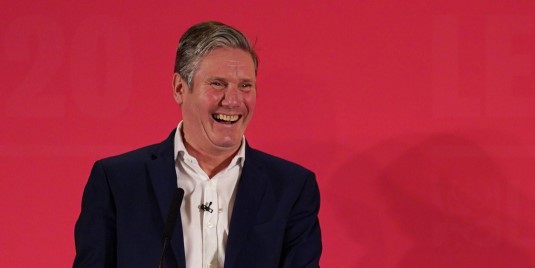Labour's Double-Digit Poll Leads

Nevertheless, there is jubilation among Labour rightists because it appears their self-serving argument for smiting the left has been proven by events. Stitch up Jeremy Corbyn, publicly disavow anything that could be construed as leftism, fix selections, and magically millions of people will notice and the party becomes electable again. A cynical empiricist will note the leads posted by Labour this last week are better than anything achieved by his predecessor, even in the immediate aftermath of the 2017 general election and the dog days of Theresa May's premiership. This means the rightwingers' argument is half correct.
Since taking office, Starmer has abandoned most of the Corbyn-lite leadership pledges that won him the top job. The strategy taken since plays up the social conservative vibes and makes a big deal about where Labour have tacked to the right of the Tories on tax cuts for businesses, for instance. Given a lot of this was rolled out this time last year when Starmer started heading south in the polls, it's not likely the ordinary punter had their imagination captured. But what it did was tell the Tory press, still the primary gatekeepers of political discourse in this country despite their waning audiences, that here was a safe pair of hands with whom they could do business. Therefore when Peter Mandelson declared there were millions of voters cheering Starmer on as he tightened up party democracy and attacked bothersome leftists, there were spectators (somewhat fewer than "millions") willing such an outcome: the editorial mouthpieces of the billionaire press barons. The quid pro quo for moving toward their commonsense is the kinder coverage Starmer has received than any of his predecessors, including Tony Blair when he was on his way out.
The thing is, Tory-adjacent/friendly positioning is not all that Starmer has said. Obviously, what has been announced so far isn't Corbynism with an expensive haircut, and can be pretty weak sauce (VAT cuts to fuel as bills rocket skyward springs to mind). But the interesting stuff about collective bargaining and trade union rights and green spending (more on this some time) is also out there and isn't raising the collective ire of the boss class. Perhaps they don't think Starmer means it and it's all a sop to win back the fast disappearing union finance, or that they recognise some modernisation is necessary for the continued health of their system, or they simply haven't noticed it given their lowkey announcement. For whatever reason, the media have barely covered these more recognisable Labour policies, which means it's unlikely the electorate have noticed either.
Taking this on board, there can only be one credible argument for understanding Labour's resurgence in the polls: Boris Johnson is calling the storm down upon himself while all Starmer has had to do is reap the benefits of not being the Tory leader. This, however, is a risky business. During the Ed Miliband years, with his usual cynicism Dan Hodges argued Labour was content to let the Liberal Democrats collapse, soak up their vote and win an election without winning over Tory supporters - an orientation dubbed the "35% strategy". Not true, but given the policy holiday the Labour leadership went on for their first two years there was little to define them and when they tried it looked incoherent. It came too late.
Starmer is fortunate thanks to the more favourable press environment and Johnson's desperate situation, but what if Johnson goes? The Tories have a track record of reinventing themselves in office and going on to win - a feat Labour has never really pulled off. As a dive into recent YouGov data shows, just under half of the 2019 Tory support are sticking with them (for the moment), while only five per cent are switching directly to Labour. 33% are don't knows/won't vote. In other words, a large pool of Tory voters who would probably flock back to the fold with a new leader in situ. Where would that leave Starmer then?
Plenty of times this last year I've attacked Starmer for being utterly useless and bereft of ideas. His leadership was sure to be doomed unless something unforeseen came along and pulled the irons out of the fire for him. That "thing", partygate, has come along and Tory ratings have collapsed. But the argument made many times here about turning Labour's back on the left and alienating the new core support also applies. The polls might shift in the coming weeks, but at present Labour are topping out at 40-41%. Corbyn at his peak achieved 45%, and in the Smith-Blair years of opposition the ratings were well in excess of that. Labour are permanently hobbled by the destruction of Scottish Labour and the gifting of its support to the SNP, the stronger showing for the Greens in the polls, and a LibDem return to double figures. Permanently, unless Labour tacks back from the right and starts speaking up for the interests of those at the core of their coalition: the low paid, the renters, the growing new working class who could give Labour a permanent majority.
Starmer leads by default because he's not Johnson, and he can't rely on him being there when the next election comes round. We need less triangulation and more an appreciation of who the Labour coalition is. The Tories understand their natural support and who's likely to swing their way. 120 years after its foundation, it's about time Labour did the same.
Image Credit